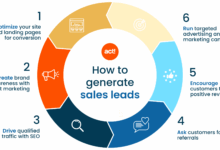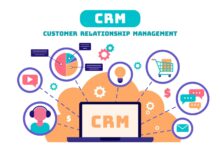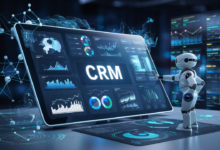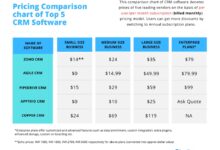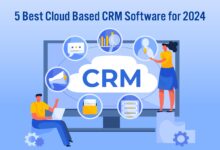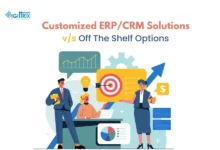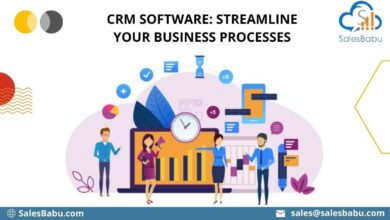Marketing Automation With CRM: Streamlining Business Processes For Success
Marketing Automation with CRM revolutionizes how businesses operate by integrating automation tools with CRM systems to enhance efficiency and drive growth. Explore the pivotal role of this dynamic duo in reshaping modern marketing strategies.
Introduction to Marketing Automation with CRM
Marketing automation with CRM involves leveraging technology to streamline and automate marketing activities, while integrating customer relationship management (CRM) tools to enhance customer interactions and insights. By combining these two powerful tools, businesses can create personalized and targeted marketing campaigns, nurture leads, and improve overall customer satisfaction.
Examples of Marketing Automation Integrated with CRM
- Automated email campaigns triggered by customer actions or behaviors, such as website visits or form submissions.
- Lead scoring and nurturing processes based on CRM data to identify and prioritize high-quality leads for sales teams.
- Personalized content recommendations generated by CRM insights to enhance customer engagement and drive conversions.
Benefits of Combining Marketing Automation and CRM Tools
- Improved lead management and conversion rates by delivering the right message to the right audience at the right time.
- Enhanced customer experience through personalized interactions and timely responses based on CRM data.
- Increased efficiency and productivity by automating repetitive marketing tasks and workflows.
- Better alignment between marketing and sales teams, leading to more effective collaboration and revenue growth.
Key Features of CRM in Marketing Automation
CRM systems play a crucial role in enhancing marketing automation processes by providing essential features that help businesses effectively manage customer relationships and improve overall marketing strategies.
Lead Management
- CRM platforms allow businesses to efficiently track and manage leads throughout the sales pipeline.
- Automated lead scoring helps prioritize leads based on their level of engagement and likelihood to convert.
- Lead nurturing campaigns can be personalized and automated to move leads through the sales funnel effectively.
Customer Segmentation
- CRM systems enable businesses to segment customers based on various criteria such as demographics, behavior, or purchase history.
- Segmented lists can be used to create targeted marketing campaigns that resonate with specific customer groups.
- Personalized messaging and content can be delivered to each segment, increasing engagement and conversions.
Integration with Marketing Automation
- CRM platforms seamlessly integrate with marketing automation tools to streamline processes and improve efficiency.
- Automated workflows can be triggered based on CRM data, ensuring timely and relevant communication with leads and customers.
- Data synchronization between CRM and marketing automation systems eliminates manual data entry and ensures data accuracy.
Integration of CRM and Marketing Automation Software
Integrating CRM software with marketing automation tools is essential for businesses looking to streamline their sales and marketing processes. This integration allows for a seamless flow of data between the two systems, enabling better lead management, personalized marketing campaigns, and improved customer engagement.
Setting up CRM Integration for Marketing Automation
Setting up CRM integration for marketing automation involves the following steps:
- Choose the right CRM and marketing automation software that are compatible with each other.
- Define the data points that need to be synchronized between the CRM and marketing automation system.
- Set up the integration by following the instructions provided by the software vendors or using integration tools like Zapier or PieSync.
- Test the integration to ensure that data is accurately flowing between the systems.
- Train your team on how to use the integrated systems effectively to maximize their benefits.
Challenges and Best Practices for Seamless Integration
- Challenges:
- Compatibility issues between CRM and marketing automation software.
- Data mapping errors leading to inaccurate information transfer.
- Lack of technical expertise in setting up and maintaining the integration.
- Best Practices:
- Choose software with native integration capabilities to minimize compatibility issues.
- Regularly audit and update data mapping to ensure accurate data synchronization.
- Provide training to employees on how to effectively use the integrated systems.
- Monitor the integration regularly to identify and address any issues promptly.
Personalization and Targeting in Marketing Automation with CRM
Personalization and targeting are crucial aspects of successful marketing automation campaigns. By leveraging CRM data, businesses can create personalized experiences for their customers, leading to higher engagement and conversions.
The Role of CRM in Personalizing Marketing Automation Campaigns
CRM plays a key role in personalizing marketing automation campaigns by providing valuable customer data that can be used to tailor messaging, offers, and content. With CRM integration, businesses can segment their audience based on demographics, behavior, and preferences, allowing for targeted and personalized communication.
- CRM data helps businesses create personalized email campaigns that resonate with individual recipients, increasing open rates and click-through rates.
- By analyzing customer interactions and purchase history stored in CRM systems, businesses can send targeted messages and offers to specific customer segments, driving conversions.
- Personalization through CRM data can lead to improved customer satisfaction and loyalty, as customers feel understood and valued by the brand.
Successful Targeted Marketing Automation Strategies Using CRM Data
Successful businesses have employed targeted marketing automation strategies using CRM data to drive results and achieve their marketing goals. For example, e-commerce companies use CRM data to send personalized product recommendations based on past purchases, browsing behavior, and preferences, resulting in increased sales and customer retention.
- Personalized retargeting ads based on CRM data have proven to be effective in re-engaging customers who have shown interest but not completed a purchase.
- Segmenting customers by lifecycle stages using CRM data allows businesses to deliver relevant content and offers at each stage of the customer journey, nurturing leads and driving conversions.
- Dynamic content personalization based on CRM insights enables businesses to deliver tailored messaging to different customer segments, improving engagement and response rates.
The Importance of Data Accuracy and Segmentation for Effective Personalization in CRM-driven Marketing Automation
Data accuracy and segmentation are essential for effective personalization in CRM-driven marketing automation. Inaccurate or incomplete data can lead to irrelevant messaging and missed opportunities, while proper segmentation ensures that the right message reaches the right audience at the right time.
- Regularly updating CRM data and ensuring its accuracy is crucial for delivering personalized experiences that resonate with customers and drive results.
- Segmenting customers based on behavior, demographics, and preferences allows businesses to tailor their marketing efforts to specific audience segments, increasing relevance and engagement.
- Personalization based on accurate data and segmentation leads to higher conversion rates, improved customer satisfaction, and long-term brand loyalty.
Automation Workflows in CRM for Marketing
Creating automation workflows within CRM systems is a crucial aspect of streamlining marketing processes. By setting triggers, conditions, and actions, businesses can automate repetitive tasks and deliver personalized experiences to customers.
Comparison of CRM Platforms for Automation Workflows
- Salesforce: Known for its robust automation capabilities, Salesforce allows users to create complex workflows with multiple triggers, conditions, and actions. The platform offers a high level of customization to tailor workflows to specific business needs.
- HubSpot: HubSpot provides a user-friendly interface for creating automation workflows. While it may not offer as much customization as Salesforce, it is a great option for businesses looking for a simpler approach to automation.
- Zoho CRM: Zoho CRM offers automation features that are suitable for small to mid-sized businesses. The platform allows users to create workflows based on specific criteria and automate tasks to improve efficiency.
Importance of Testing and Optimizing Automation Workflows
Automation workflows need to be continuously tested and optimized to ensure they are effective in improving marketing processes. By analyzing data and performance metrics, businesses can identify areas for improvement and make necessary adjustments to enhance the overall workflow efficiency.
Integration of CRM Automation Workflows with Marketing Tools
Integrating CRM automation workflows with other marketing tools and platforms is essential for creating a seamless workflow. By connecting CRM systems with email marketing software, social media platforms, and analytics tools, businesses can automate marketing campaigns and track performance across different channels.
Case Study Scenario: Marketing Campaign Automation
In a hypothetical scenario, a company uses CRM automation workflows to automate a targeted email marketing campaign. By setting triggers based on customer behavior, such as website visits or product purchases, the company can send personalized email content to engage customers effectively. The expected results include higher open rates, click-through rates, and ultimately, increased sales and customer satisfaction.
Lead Management and Conversion Tracking
Lead management and conversion tracking are crucial components of marketing automation, and CRM systems play a vital role in facilitating these processes. By effectively utilizing CRM tools, businesses can nurture leads through the conversion funnel, measure campaign effectiveness, prioritize and segment leads, and streamline lead nurturing workflows.
Lead Nurturing and Conversion Funnel
- CRM systems help in nurturing leads at various stages of the conversion funnel by providing insights into customer interactions, preferences, and behaviors.
- Best practices include creating personalized communication, targeted offers, and timely follow-ups to move leads towards conversion.
- Automated workflows in CRM can trigger actions based on lead behavior, such as sending personalized emails or notifications to engage leads further.
Campaign Effectiveness Analysis
- CRM enables businesses to measure and analyze the effectiveness of marketing campaigns by tracking lead interactions, conversions, and ROI.
- Key metrics such as conversion rates, customer acquisition costs, and customer lifetime value can be monitored to optimize campaign performance.
- CRM analytics provide insights into campaign attribution, customer journey mapping, and ROI calculation for informed decision-making.
Lead Prioritization and Segmentation
- CRM systems offer features for lead scoring, prioritization, and segmentation based on criteria such as lead behavior, demographics, and engagement level.
- By segmenting leads into categories like hot, warm, and cold, businesses can focus their efforts on high-potential leads for better conversion rates.
- Automated lead assignment and routing in CRM streamline the process of distributing leads to sales teams for timely follow-up and conversion.
Data Integration and Analytics for Conversion Tracking
- Integration of CRM with other marketing tools like email marketing platforms, analytics software, and social media channels is essential for accurate conversion tracking.
- CRM analytics help identify trends and patterns in lead behavior, allowing businesses to create targeted marketing strategies for improved lead conversion.
- By analyzing lead engagement, touchpoints, and interactions across multiple channels, businesses can optimize their marketing efforts and increase conversion rates.
Customer Journey Mapping with CRM in Marketing Automation
Customer journey mapping is a crucial aspect of marketing automation that allows businesses to understand and optimize the various touchpoints a customer goes through before making a purchase. CRM tools play a significant role in facilitating this process by providing valuable data and insights into customer behavior.
Key Features of CRM Tools for Customer Journey Mapping
- Centralized customer data storage
- Tracking customer interactions across multiple channels
- Segmentation capabilities for targeted marketing
- Integration with marketing automation software
Creating a Customer Journey Map with CRM Data
Customer journey mapping involves analyzing CRM data to identify key touchpoints and interactions that influence a customer’s decision-making process. This can be done by:
- Identifying customer touchpoints across different channels (website visits, email interactions, social media engagement).
- Analyzing customer behavior and preferences based on CRM data.
- Mapping out the customer journey stages from awareness to conversion.
- Using CRM insights to personalize marketing strategies at each touchpoint.
Analyzing CRM Data for Optimizing Customer Journey
To optimize the customer journey, follow these steps:
- Review customer interactions and feedback stored in the CRM.
- Identify bottlenecks or gaps in the customer journey.
- Segment customers based on their behavior and preferences.
- Create targeted marketing campaigns to address specific customer needs.
Personalizing Marketing Strategies with CRM Data
CRM data can be used to personalize marketing strategies at different stages of the customer journey by:
- Sending targeted emails based on customer preferences.
- Offering personalized product recommendations based on past purchases.
- Creating customized landing pages for different customer segments.
Role of CRM Analytics in Measuring Effectiveness
CRM analytics play a crucial role in measuring the effectiveness of customer journey mapping by:
- Tracking key performance indicators (KPIs) such as conversion rates and customer retention.
- Identifying trends and patterns in customer behavior.
- Adjusting marketing strategies based on CRM data insights.
Reporting and Analytics in CRM-Driven Marketing Automation
When it comes to marketing automation with CRM, reporting and analytics play a crucial role in tracking performance, optimizing campaigns, and improving ROI.
CRM Reporting Capabilities
- CRM systems offer detailed reports on key metrics such as lead generation, conversion rates, customer engagement, and campaign effectiveness.
- Customizable dashboards allow marketers to track real-time data and performance indicators to make informed decisions.
- Reports can be generated for different segments, campaigns, and channels to analyze the effectiveness of each marketing strategy.
Analyzing CRM Data for Optimization
- CRM analytics provide insights into customer behavior, preferences, and interactions with marketing campaigns.
- By analyzing data trends, marketers can identify successful tactics, target high-value leads, and personalize communications for better engagement.
- Understanding customer data helps in creating more targeted and effective marketing campaigns that resonate with the audience.
Real-Time Data Insights for Improved ROI
- Real-time data from CRM systems enable marketers to make quick adjustments to campaigns based on performance metrics.
- By monitoring engagement and conversion rates in real-time, marketers can optimize campaigns for better results and higher ROI.
- Access to up-to-date data allows for agile marketing strategies that adapt to changing market trends and customer preferences.
Customer Retention Strategies with CRM and Marketing Automation
Customer retention is crucial for business growth as it costs less to retain existing customers than to acquire new ones. CRM systems play a vital role in helping businesses analyze customer data to identify opportunities for retention.
Setting up a Loyalty Program using CRM-integrated Marketing Automation
- Define your loyalty program objectives and goals.
- Segment your customer base to tailor rewards and incentives.
- Automate personalized communications for loyalty program members.
- Track and analyze customer behavior to optimize the loyalty program.
Personalized Communication Tactics for Customer Retention
- Send personalized emails based on past purchases or interactions.
- Offer exclusive discounts or promotions to loyal customers.
- Use customer feedback to improve products or services.
Benefits of Using Marketing Automation in Customer Retention
- Streamline communication processes for consistent engagement.
- Automate follow-up activities to nurture customer relationships.
- Track customer interactions for targeted and personalized marketing.
Comparison of CRM Platforms for Customer Retention Strategies
| CRM Platform | Features for Customer Retention |
|---|---|
| Salesforce | Advanced data analytics for customer insights. |
| HubSpot | Automated workflows for personalized customer engagement. |
| Zoho CRM | Customer segmentation for targeted marketing campaigns. |
Omnichannel Marketing Automation with CRM
Omnichannel marketing automation with CRM is crucial for businesses looking to engage with customers across multiple channels seamlessly. By leveraging the key features of CRM systems, companies can create personalized and targeted campaigns that resonate with their audience on various platforms.
Key Features of CRM for Omnichannel Marketing Automation
- Centralized Customer Data Management: CRM consolidates customer information from different channels into a single database, providing a holistic view of each customer’s interactions.
- Integrated Communication Tools: CRM platforms offer email marketing, SMS, social media integration, and more, enabling businesses to reach customers through their preferred channels.
- Cross-Channel Campaign Orchestration: CRM allows for the coordination of marketing campaigns across multiple channels, ensuring a consistent brand experience for customers.
Integrating CRM with Marketing Channels for Automation
- Step 1: Identify Key Channels – Determine the channels where your target audience is most active.
- Step 2: Data Integration – Connect CRM with various marketing channels to sync customer data in real-time.
- Step 3: Automation Setup – Implement automation workflows to trigger personalized messages based on customer interactions.
Customer Data Analysis for Optimizing Omnichannel Strategies
- Utilize CRM analytics to track customer behavior across channels and identify patterns for targeted marketing.
- Segment customers based on their preferences and engagement history to deliver relevant content through each channel.
Comparing CRM Platforms for Omnichannel Marketing Automation
- Assess CRM platforms based on their integration capabilities, scalability, and reporting functionalities for omnichannel campaigns.
- Consider the ease of use and customization options to tailor the CRM solution to your specific omnichannel marketing needs.
Case Study: Personalized Messaging Impact through Omnichannel Automation
By leveraging CRM data for personalized messaging across email, social media, and mobile channels, Company X saw a 20% increase in customer engagement and a 15% rise in conversion rates.
Real-Time Customer Engagement in Omnichannel Strategy
- Utilize CRM data to engage with customers in real-time, delivering timely offers and content through their preferred channels.
- Implement chatbots and AI-driven tools to provide instant support and assistance across multiple touchpoints.
Measuring Success of Omnichannel Automation Campaigns
- Track key metrics like conversion rates, engagement levels, and customer retention across all channels to gauge campaign performance.
- Set KPIs for each channel and monitor the impact of omnichannel marketing efforts on overall business goals.
Ethical Considerations and Best Practices in Omnichannel Automation
- Ensure compliance with data privacy regulations and obtain consent for personalized marketing communications.
- Implement transparent communication practices and allow customers to opt-out of specific channels if desired.
Enhancing CRM with AI for Omnichannel Automation
- Integrate AI and machine learning algorithms to analyze customer data and predict future behavior for personalized marketing campaigns.
- Automate customer interactions through AI-powered chatbots to provide round-the-clock support and enhance the omnichannel experience.
Compliance and Data Security in CRM-Integrated Marketing Automation
When it comes to utilizing CRM for marketing automation, compliance and data security are crucial aspects that cannot be overlooked. Maintaining the privacy and security of customer data is not only a legal requirement but also essential for building trust with your audience.
Importance of Compliance and Data Security
Compliance with regulations such as GDPR (General Data Protection Regulation) is fundamental in ensuring that customer data is handled responsibly and transparently. CRM systems play a significant role in helping businesses adhere to these regulations by providing tools for data encryption, access control, and auditing.
-
Data encryption: CRM systems offer encryption capabilities to protect sensitive information from unauthorized access.
-
Access control: By setting user permissions and roles, CRM systems ensure that only authorized personnel can view or modify sensitive data.
-
Auditing: CRM systems keep a record of data access and modifications, allowing businesses to track any changes made to customer information.
Best Practices for Compliance and Data Protection
Implementing best practices for compliance and data protection is essential to safeguarding customer data and maintaining trust. Some key practices include:
- Regularly update privacy policies and terms of service to reflect changes in regulations.
- Provide training to employees on data security measures and compliance requirements.
- Obtain explicit consent from customers before collecting and using their personal data.
- Regularly conduct security audits and assessments to identify and address any vulnerabilities in the CRM system.
Training and Skill Development for CRM-Driven Marketing Automation
Training and skill development play a crucial role in effectively leveraging CRM-driven marketing automation processes. By upskilling teams in utilizing CRM tools within marketing automation platforms, businesses can maximize the benefits of personalized customer engagement and retention strategies.
Training Requirements for CRM in Marketing Automation
- Provide hands-on training sessions on CRM software functionalities and integration with marketing automation tools.
- Offer online courses or workshops focused on data management, segmentation, and customer journey mapping within CRM systems.
- Create training modules that emphasize the importance of aligning CRM data with marketing automation strategies for targeted campaigns.
Setting Up Personalized Customer Journeys with CRM Data
- Begin by analyzing customer data within the CRM system to understand preferences, behaviors, and interactions.
- Segment the customer base based on demographics, purchase history, and engagement levels to tailor personalized communication.
- Map out automated workflows using CRM data to deliver targeted messages at each stage of the customer journey.
Integrating CRM Tools with Email Marketing Automation
- Sync CRM databases with email marketing platforms to ensure seamless communication and consistent messaging across channels.
- Create automated triggers based on CRM data, such as lead scoring or behavior tracking, to send personalized emails to customers.
- Analyze email performance metrics within the CRM system to optimize campaigns and improve engagement rates.
Successful CRM-Driven Marketing Automation Strategies
- Utilizing CRM data for dynamic content personalization resulted in a 20% increase in email open rates and a 15% boost in click-through rates.
- Implementing lead nurturing workflows based on CRM insights led to a 25% increase in conversion rates and a 30% decrease in customer acquisition costs.
- Integrating CRM with social media advertising platforms enhanced targeting capabilities, resulting in a 40% growth in customer acquisition from social channels.
Future Trends and Innovations in Marketing Automation with CRM
Predictive analytics plays a crucial role in enhancing personalized marketing campaigns within CRM-driven automation. By analyzing customer data and behavior patterns, businesses can predict future actions and tailor their marketing strategies accordingly.
Role of Predictive Analytics
- Utilizing predictive analytics helps in segmenting customers based on their preferences and past interactions with the brand.
- It enables businesses to anticipate customer needs and deliver targeted messages at the right time through automated workflows.
- By leveraging predictive analytics, companies can increase customer engagement and drive conversions effectively.
Impact of Chatbots and Conversational AI
- Chatbots and conversational AI are revolutionizing customer engagement strategies in CRM automation by providing instant support and personalized interactions.
- These technologies enhance the customer experience by offering real-time assistance and resolving queries efficiently.
- Integration of chatbots with CRM platforms enables seamless communication and enhances lead nurturing processes.
Successful Integration with Social Media Channels
- Successful integration between CRM platforms and social media channels allows businesses to gather valuable customer data and engage with their target audience effectively.
- By leveraging social media insights within CRM systems, companies can create personalized marketing campaigns and drive customer acquisition.
- Integration with social media channels enables businesses to reach a wider audience and enhance brand visibility across platforms.
Importance of Data Privacy and Compliance
- Data privacy and compliance regulations are crucial in the implementation of AI-driven CRM marketing automation to ensure the security and confidentiality of customer information.
- Businesses need to adhere to data protection laws and regulations to build trust with customers and maintain ethical practices in marketing automation.
- Implementing robust data security measures and complying with privacy regulations enhance brand reputation and foster long-term customer relationships.
Final Conclusion
Embracing Marketing Automation with CRM empowers businesses to navigate the competitive landscape with precision and agility. By leveraging the synergies between automation and CRM, organizations can unlock new opportunities for customer engagement and revenue generation.
